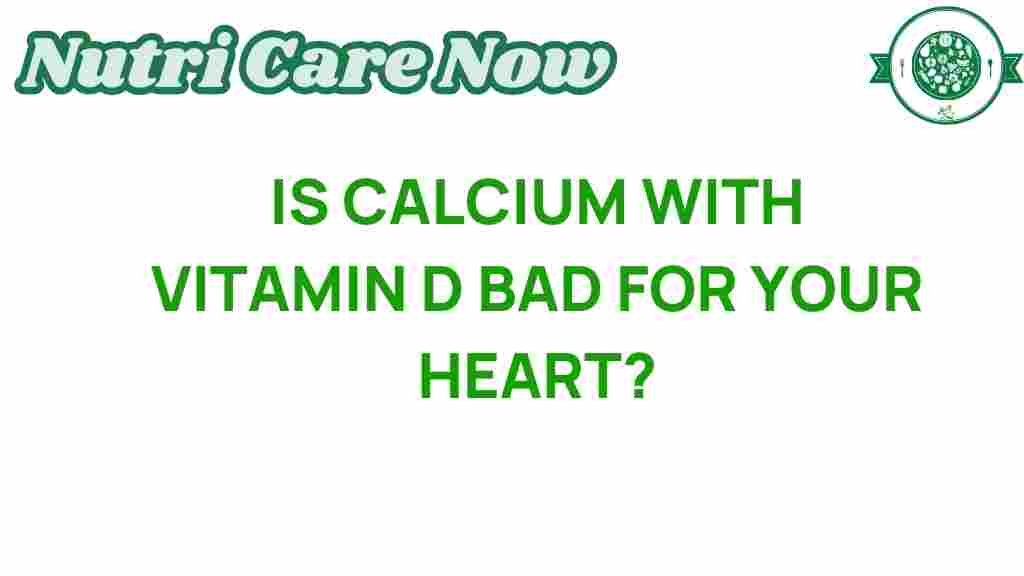Is Calcium with Vitamin D Harming Your Heart Health?
Calcium and vitamin D are two essential nutrients that play crucial roles in maintaining overall health, particularly in bone strength and immune function. However, recent studies have raised concerns about their impact on heart health, especially when taken in supplement form. In this article, we will explore the relationship between calcium, vitamin D, and cardiovascular health, examining the potential risks associated with these supplements and how they fit into a balanced diet.
Understanding Calcium and Vitamin D
Calcium is a mineral vital for various bodily functions, including:
- Building and maintaining strong bones and teeth
- Supporting muscle function
- Facilitating nerve transmission
Vitamin D, on the other hand, is essential for calcium absorption in the body. It helps regulate calcium levels and supports immune function. The primary sources of vitamin D include:
- Sunlight exposure
- Fatty fish (like salmon and mackerel)
- Fortified foods (such as milk and cereals)
- Supplements
The Importance of Heart Health
Heart health is a critical aspect of overall wellness. Cardiovascular diseases are among the leading causes of death worldwide, making it essential to understand the factors contributing to heart health. A balanced diet rich in essential nutrients, regular physical activity, and maintaining a healthy weight are fundamental to supporting cardiovascular wellness.
The Role of Calcium and Vitamin D in Cardiovascular Health
Calcium and vitamin D are often touted for their benefits in various health domains. However, their relationship with heart health is complex and can lead to controversy, particularly regarding supplementation. Here are some key considerations:
- Calcium’s Impact: While calcium is necessary for muscle contraction, including the heart, excessive calcium intake, particularly through supplements, has been linked to an increased risk of cardiovascular events.
- Vitamin D’s Influence: Vitamin D may have protective benefits for the heart, as deficiencies have been associated with an increased risk of heart disease. However, the optimal levels of vitamin D for heart health are still being studied.
Examining the Risks of Calcium and Vitamin D Supplements
While adequate amounts of calcium and vitamin D are crucial for health, the potential risks associated with taking these in supplement form warrant careful consideration.
Calcium Supplements and Heart Health
Research has suggested that high doses of calcium supplements may be linked to adverse cardiovascular outcomes:
- Increased Risk of Heart Attack: Some studies indicate that individuals taking calcium supplements may have a higher risk of heart attacks compared to those who obtain calcium through food sources.
- Calcium Deposits: Excessive calcium can lead to calcification of arteries, which is a significant risk factor for cardiovascular diseases.
Vitamin D Supplements and Heart Health
While vitamin D is generally considered beneficial for heart health, there are nuances to its supplementation:
- Over-Supplementation: High doses of vitamin D can lead to toxicity, potentially causing hypercalcemia, which can adversely affect cardiovascular health.
- Finding the Right Balance: The right levels of vitamin D are essential, but more is not always better. Regular monitoring of vitamin D levels is advisable.
Dietary Sources vs. Supplements
One of the key debates in nutrition is whether it’s better to obtain nutrients from food or supplements. Here’s why focusing on a well-balanced diet is often recommended:
- Whole Foods: Foods rich in calcium and vitamin D, such as dairy products, leafy greens, and fatty fish, provide a range of other nutrients that work synergistically for heart health.
- Lower Risk: Obtaining calcium and vitamin D through diet rather than supplements may reduce the risk of cardiovascular issues associated with excessive intake.
Recommendations for Heart Health
To optimize heart health while ensuring adequate calcium and vitamin D intake, consider the following recommendations:
- Assess Your Diet: Evaluate your dietary intake of calcium and vitamin D. Aim for natural sources before resorting to supplements.
- Consult a Healthcare Professional: Before starting any supplements, especially if you have existing health conditions or are on medication, consult your doctor or a registered dietitian.
- Monitor Levels: Regular blood tests can help determine if you are deficient in vitamin D or if your calcium levels are in a healthy range.
Troubleshooting Potential Issues
If you are concerned about the impact of calcium and vitamin D on your heart health, consider the following troubleshooting tips:
- Adjust Supplementation: If you are taking supplements, ensure you are not exceeding the recommended daily allowances. Consider reducing the dosage if you experience any adverse effects.
- Prioritize Nutrition: Focus on improving your diet by incorporating more calcium and vitamin D-rich foods rather than relying solely on supplements.
- Stay Informed: Keep up with the latest research regarding calcium, vitamin D, and heart health to make informed decisions about your wellness.
Conclusion
Calcium and vitamin D are essential for overall health, but their role in heart health is complex. While these nutrients are critical for bone health and various bodily functions, excessive supplementation may pose risks to cardiovascular wellness. It is advisable to obtain these nutrients through a balanced diet rich in whole foods, monitor your levels, and consult healthcare professionals when considering supplements.
In summary, understanding the relationship between calcium, vitamin D, and heart health is crucial for making informed decisions about your nutrition and wellness. By prioritizing a healthy diet and lifestyle, you can support your heart health effectively.
For more information on heart health and nutrition, check out this resource. Stay heart-healthy!
If you have questions or need guidance on dietary supplements, please reach out to a healthcare professional or visit this site for reliable information.
This article is in the category Supplements and created by NutriCareNow Team
